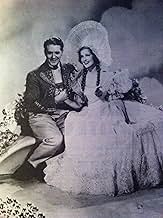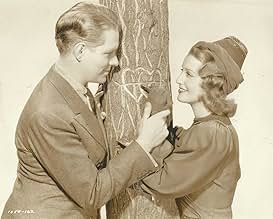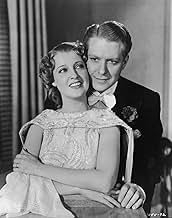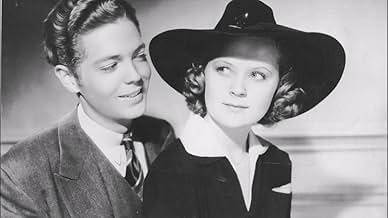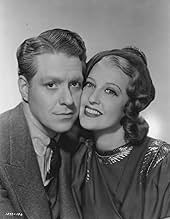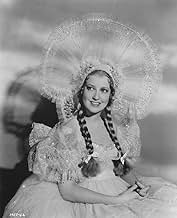Agrega una trama en tu idiomaThe team behind a successful Broadway production tries to stop the married stars from transitioning to Hollywood.The team behind a successful Broadway production tries to stop the married stars from transitioning to Hollywood.The team behind a successful Broadway production tries to stop the married stars from transitioning to Hollywood.
- Dirección
- Guionistas
- Elenco
- Nominado a 2 premios Óscar
- 5 premios ganados y 2 nominaciones en total
Opiniones destacadas
In glorious Technicolor,the stars are probably at their best,exceeding such romances as "New Moon","Rose Marie" and the others. Production values are enormous,beginning with a dance by Ray Bolger to a Dutch background heightened in color by beds of tulips.They are just enough not to be overwhelming. Jean and Nelson are the stars in the film of the sixth year of the stage production of Victor Herbert's 1913 show "Sweethearts" and are being done to death by the importunities of radio,recording,and family demands. Frank Morgan is his usual perplexed and harassed self as the stage producer,Herman Bing and Misha Auer are in top form as a mutually fighting conductor and wannabe playwright. One delightful vignette is during her modelling session at a dressmaker's shop,where she shows off the various colors and styles for different occasions. One gem is Eddy's race,pursued by speed cops,in a taxi from recording studio to NBC radio (looking much then as now) where Jeanette awaits him,having just broadcast Herbert's "Badinage" ably accompanied with much panache by Dalies Frantz.Some of her old Lubitsch (Director "Merry Widow"et al.) sassiness comes out as she mimes with the audience, until Eddy arrives, looking like a naughty schoolboy,with sleeve pulled up arm' amid her tidying of his appearance. One of the nicest shots is down the staircase at their home during the duet of "Little Gray home in the West",one of the most sincere performances. Herbert Stothart deserves much credit for his arrangement of Herbert's melodies,the duets and the delightful continuous orchestrations of the sound track. I would certainly watch this masterpiece several times.
Much has been made of Jeanette MacDonald's singing, but there is never much mention of her beauty. She was very beautiful, with a vibrant personality and good acting ability. All of this is shown to advantage in this big-budget MGM extravaganza, "Sweethearts," a huge 1938 hit in which MacDonald costarred during her successful partnership with Nelson Eddy.
This isn't really the operetta "Sweethearts" - rather, it's a modern story about a couple starring in a show called "Sweethearts" on Broadway. The script is by Alan Campbell and Dorothy Parker, and we meet our singing lovebirds, married in real life, in their sixth year run of the show. Hollywood is beckoning to them; the couple is exhausted by an endless round of shows, radio appearances, and parties they must attend. Hollywood - the free evenings, the time off between films, the sunshine - is starting to sound pretty good to them. The producers of the show are in a panic. They have to keep them from going to Hollywood; since Hollywood is interested in both of them as a team, perhaps if they were no longer a team...
I've read a good deal here about "glorious Technicolor" - it's beautiful but a little garish. The film is filled, naturally, with lots and lots of music. MacDonald's voice never did much for me - nice middle, not much of a top most of the time - probably due to the way singers were taught back then. Eddy is extremely handsome in Technicolor and his magnificent baritone is well-served by the music.
I was recently reading about the stories that have been going around for years that the couple was secretly in love, supposedly supported by MacDonald's sister. It's the subject of a new musical and book. MacDonald's husband Gene Raymond did indeed resemble Eddy, and her marriage to Raymond was a Louis B. Mayer special - arranged. I think there is probably truth to the stories, and it makes sense that one reason for not marrying was that Eddy wouldn't have wanted her to work.
I read a comment here that the script is dated, etc. - MacDonald and Eddy were of their time, and they need to be appreciated in that context. When that is done, they bring us back to a more innocent time, pre-World War II, and they're wonderful.
This isn't really the operetta "Sweethearts" - rather, it's a modern story about a couple starring in a show called "Sweethearts" on Broadway. The script is by Alan Campbell and Dorothy Parker, and we meet our singing lovebirds, married in real life, in their sixth year run of the show. Hollywood is beckoning to them; the couple is exhausted by an endless round of shows, radio appearances, and parties they must attend. Hollywood - the free evenings, the time off between films, the sunshine - is starting to sound pretty good to them. The producers of the show are in a panic. They have to keep them from going to Hollywood; since Hollywood is interested in both of them as a team, perhaps if they were no longer a team...
I've read a good deal here about "glorious Technicolor" - it's beautiful but a little garish. The film is filled, naturally, with lots and lots of music. MacDonald's voice never did much for me - nice middle, not much of a top most of the time - probably due to the way singers were taught back then. Eddy is extremely handsome in Technicolor and his magnificent baritone is well-served by the music.
I was recently reading about the stories that have been going around for years that the couple was secretly in love, supposedly supported by MacDonald's sister. It's the subject of a new musical and book. MacDonald's husband Gene Raymond did indeed resemble Eddy, and her marriage to Raymond was a Louis B. Mayer special - arranged. I think there is probably truth to the stories, and it makes sense that one reason for not marrying was that Eddy wouldn't have wanted her to work.
I read a comment here that the script is dated, etc. - MacDonald and Eddy were of their time, and they need to be appreciated in that context. When that is done, they bring us back to a more innocent time, pre-World War II, and they're wonderful.
Sweethearts was the first color film for Nelson & Jeanette, and they, and the film are quite beautiful.They portray a married couple, appearing in musical comedy. This shows Nelson at his most playful--the "Pretty as A Picture" duet was so personal, I thought I was privy to a private moment between them. Too bad, MGM never took advantage of Nelson's self depreciating talent, but this film is most interesting, because it gives us a fascinating glimpse of what might have been.
"Sweethearts" has so much going for it that it's painful to admit to some lesser Victor Herbert songs as main features. Eddy and MacDonald are fine, the Technicolor is lovely, and the cast is top notch. Unfortunately, there are only about two songs that are worthy of the great Herbert.
Well, every composer can't turn out all hits; it's just unfortunate that the lesser songs are given such up front treatment. As much as the stars pour their all into these songs, they fall rather flat and unmemorable.
The production numbers are spectacular, the production design lovely, and the costumes eye-popping. Too bad this one didn't rise to the level of the duo's other film entries. Still, kudos to the quality of both the singing and acting of Eddy-MacDonald.
Well, every composer can't turn out all hits; it's just unfortunate that the lesser songs are given such up front treatment. As much as the stars pour their all into these songs, they fall rather flat and unmemorable.
The production numbers are spectacular, the production design lovely, and the costumes eye-popping. Too bad this one didn't rise to the level of the duo's other film entries. Still, kudos to the quality of both the singing and acting of Eddy-MacDonald.
MGM spared no expense in dressing up the sets and costumes for an opulent technicolor musical starring America's singing sweethearts, Jeanette MacDonald and Nelson Eddy. They even included a witty script by Dorothy Parker, songs by Victor Herbert and a supporting cast that included Frank Morgan, Ray Bolger, Reginald Gardiner and Allyn Joslyn. But changing tastes have made this one questionable material for today's audiences.
This time the stars are not in period costumes. The story is a contemporary one about two stage stars tired of appearing for the sixth straight year on Broadway in a musical called "Sweethearts" who decide to give Hollywood a try. Plot complications occur when blustery Frank Morgan uses trickery to make Jeanette believe Nelson is cheating on her. Everything is straightened out for a happy ending that reunites the two stars and has them both returning to the Broadway scene where their hearts truly lie.
Fans of the famous duo will undoubtedly enjoy this one, but today's movie fans are likely to be put off by much of the humor. Acting styles and singing tastes have changed drastically since 1938. The stars are in fine voice but the songs are not among Herbert's best and, while there are a few amusing moments, the film has a very dated quality both in story and acting that makes it sometimes seem like an unpleasant pill to swallow.
This is true even though both stars are photographed to advantage and are still at their physical peak here--but as a musical, despite the technicolor trimmings, it falls short of being a real winner.
This time the stars are not in period costumes. The story is a contemporary one about two stage stars tired of appearing for the sixth straight year on Broadway in a musical called "Sweethearts" who decide to give Hollywood a try. Plot complications occur when blustery Frank Morgan uses trickery to make Jeanette believe Nelson is cheating on her. Everything is straightened out for a happy ending that reunites the two stars and has them both returning to the Broadway scene where their hearts truly lie.
Fans of the famous duo will undoubtedly enjoy this one, but today's movie fans are likely to be put off by much of the humor. Acting styles and singing tastes have changed drastically since 1938. The stars are in fine voice but the songs are not among Herbert's best and, while there are a few amusing moments, the film has a very dated quality both in story and acting that makes it sometimes seem like an unpleasant pill to swallow.
This is true even though both stars are photographed to advantage and are still at their physical peak here--but as a musical, despite the technicolor trimmings, it falls short of being a real winner.
¿Sabías que…?
- TriviaThis is MGM's first full-length film to feature a different lion roaring in the logo, by the name of Tanner. He appeared at the beginning of MGM's Technicolor feature films and cartoons from 1936 to 1956 and later, from 1963 to 1967.
- Citas
Felix Lehman: [Counting on Gwen and Ernest's gullibility] I'm an old man and I don't get many pleasures, but you go ahead. Just think about yourselves. Forget about me.
- Créditos curiososA written epilogue explains: "In our screen play, certain dramatic liberties have been taken with the operetta 'SWEETHEARTS'. We depict the scenes from the operetta as though it was a recent production presented by a wholly fictitious producer Felix Lehman and composed and written by two wholly imaginary persons Oscar Engel and Leo Kronk whereas the stage operetta 'SWEETHEARTS' was actually written and produced on the stage about 1913, Victor Herbert composing the music and Frédérique De Grésac (as Fred de Gresac), Robert B. Smith and Harry B. Smith writing the book and lyrics."
- ConexionesFeatured in Nelson and Jeanette (1993)
- Bandas sonorasSweethearts
(1938) (uncredited)
Music by Victor Herbert (1913)
Lyrics by Bob Wright and Chet Forrest
Played during the opening credits and often in the score
Performed by Jeanette MacDonald and Nelson Eddy
Reprised by them for a radio broadcast with chorus
Later sung by MacDonald with Douglas McPhail and Eddy with Betty Jaynes
Selecciones populares
Inicia sesión para calificar y agrega a la lista de videos para obtener recomendaciones personalizadas
Detalles
- Fecha de lanzamiento
- País de origen
- Idioma
- También se conoce como
- Ljubavnici
- Locaciones de filmación
- Productora
- Ver más créditos de la compañía en IMDbPro
- Tiempo de ejecución1 hora 54 minutos
- Color
- Relación de aspecto
- 1.37 : 1
Contribuir a esta página
Sugiere una edición o agrega el contenido que falta

Principales brechas de datos
By what name was Sweethearts (1938) officially released in India in English?
Responda
